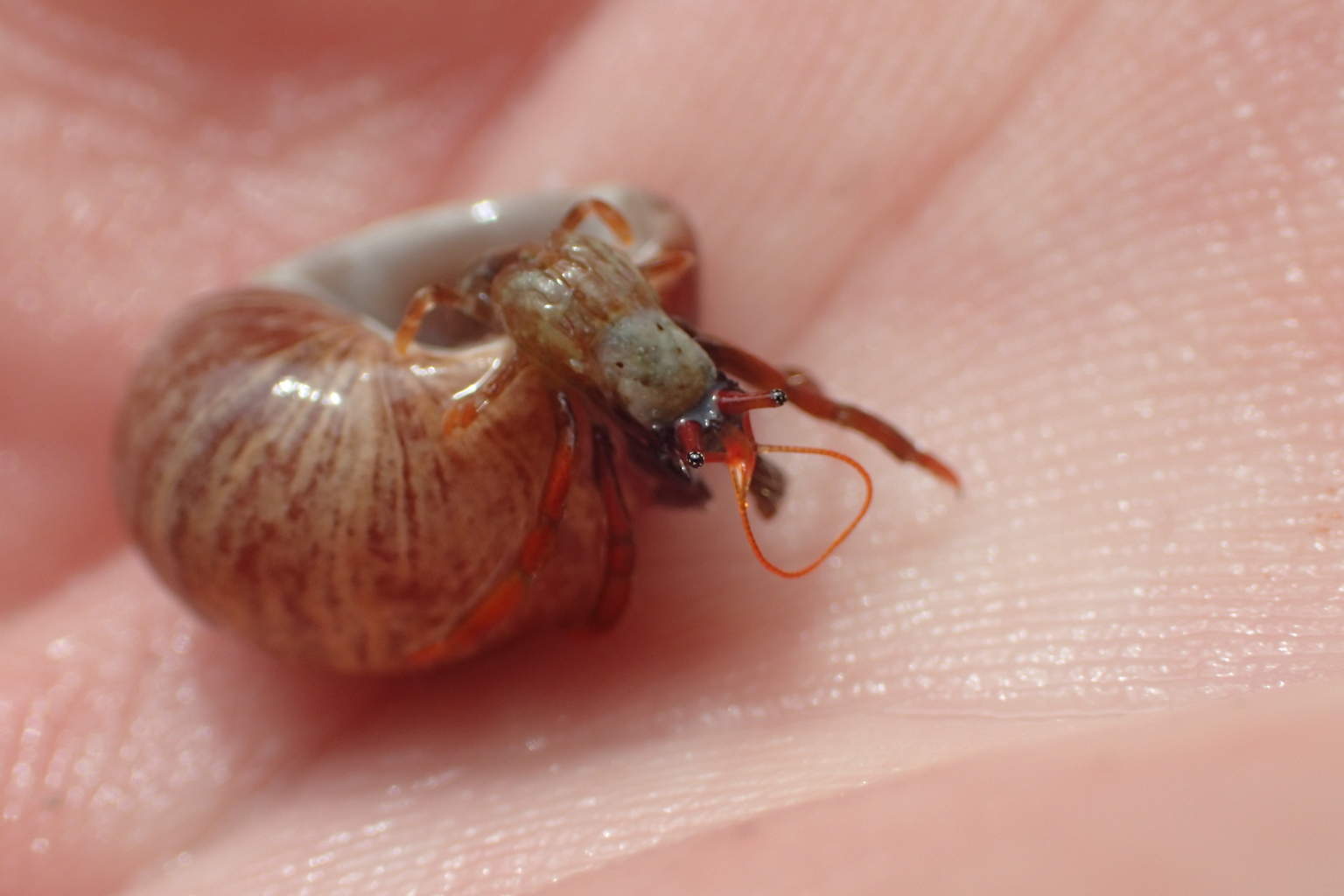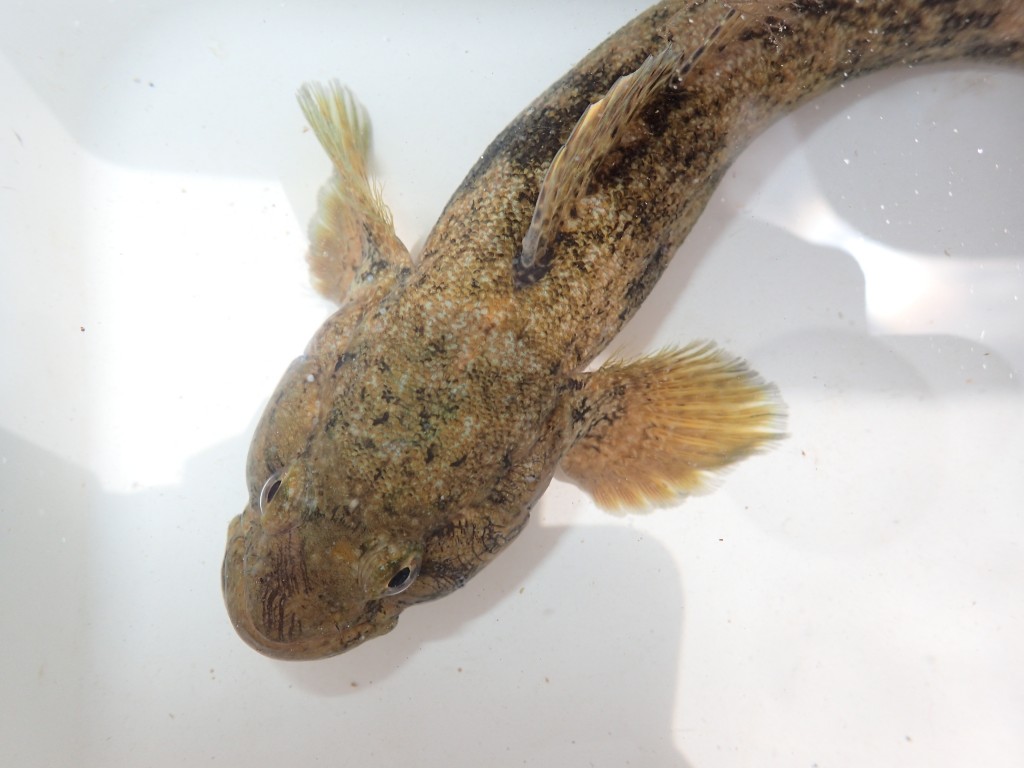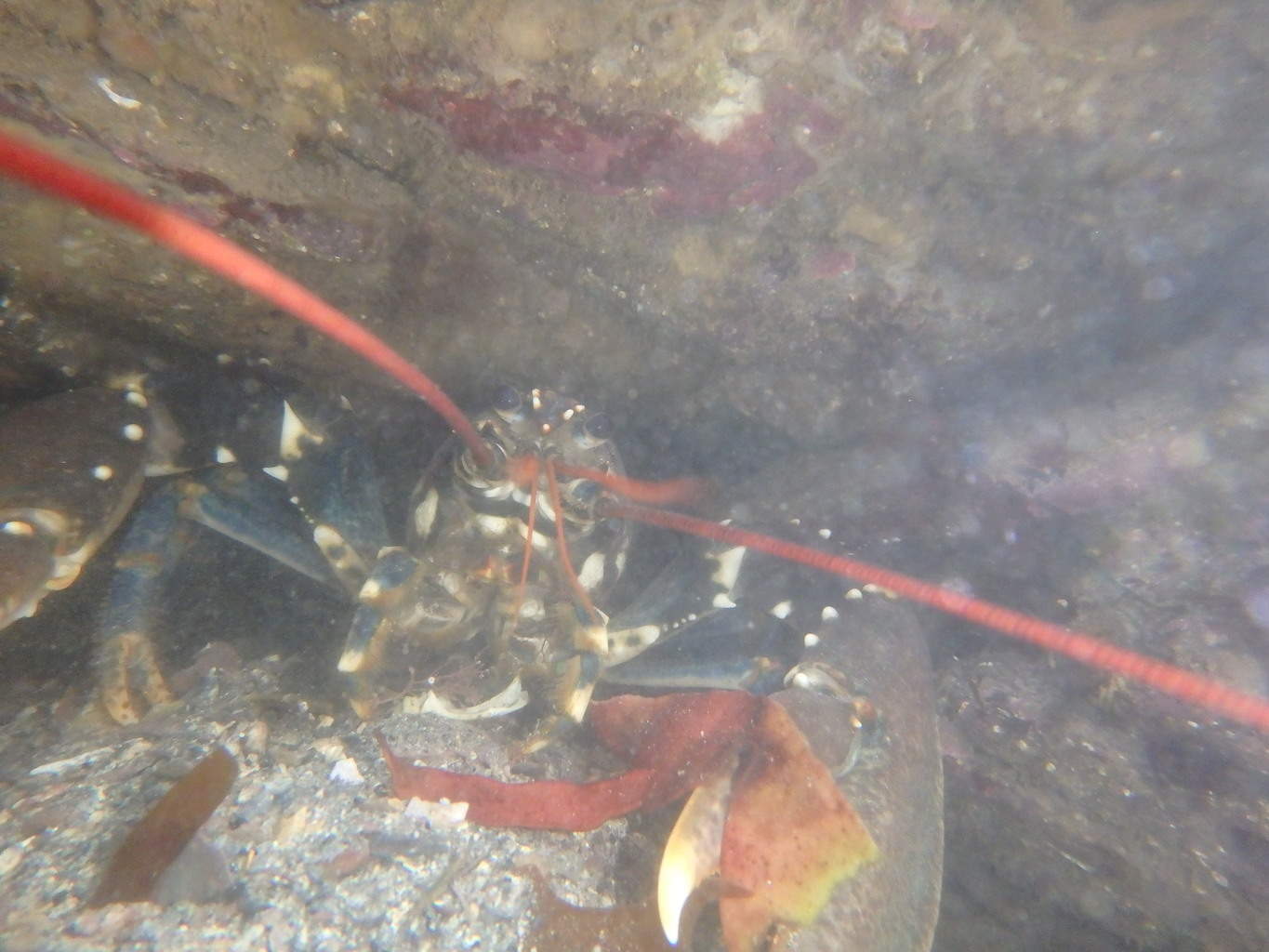News
Summer of Surprises!

The summer season is now coming to an end here at Wembury Marine Centre, but what a year it’s been! This season we have opened our doors to almost 25,000 visitors, worked with 2500 school and college students and engaged with 2000 members of the public through our marine outreach programme.
Our regular Rockpool Safaris are a firm favourite for families and this season we have found some amazingly weird and wonderful species. Here is my top five for 2016:
St Piran’s hermit crab, Clibanarius erythropus
Back in August, one of our long term volunteers John Hepburn found what he thought to be a ‘normal’ Common hermit crab on one of our public rockpool safaris. Upon closer inspection he realised it looked a bit different, but being colour blind he couldn’t really tell. He took a few close up pictures and when we had a look on the computer back in the Centre, we realised this was no normal hermit crab! It turned out to be the St Piran’s Hermit Crab, Clibanarius erythropus, which hadn’t been recorded in Devon for more than 30 years! St Piran’s hermit crabs are different to the Common hermit crab, Pagurus bernhardus, in that they have distinctly red legs and claws and red eye stalks with black and white eyes. It is thought that the hermit crabs (along with the dog whelk shells they often live in) were heavily affected by the Torrey Canyon oil spill back in the late 60s, which wiped out much of their population. Our find made the national news and we have since found quite a few more individuals. Let’s hope they have made a comeback and are here to stay!
Giant goby, Gobius cobitis
In the UK, the giant goby is usually only found along the coast of south-west England between Wembury and the Isles of Scilly, and in the Channel Islands. This large goby, reaching a maximum length of 27cm, is quite a rare find in Britain because here they are on the northern edge of their natural range, although climate change may see them move further north in the future. These large intertidal fish are usually found in sheltered rockpools higher up on the shore. Given their rarity and the fact that they are vulnerable to human disturbance and trampling, giant gobies are now a protected species and you must have a licence to handle them! They can be easily confused with other goby species, so as soon as we’d taken a picture of this one in our tub and realised it might be a Giant goby, we put it straight back where we found it, as we do with all our creatures on our rockpool safaris!
Common lobster, Homarus gammarus
Again it was volunteer John who found the first Common lobster ever to be spotted on a Wembury rockpool safari! Trying out his new weighted camera, he left it in our favourite large rockpool for the duration of our safari and when he got home and looked over the footage, he found the young lobster excavating a burrow! Common lobsters are very rare to find in rockpools, usually preferring the relative safety of deeper waters. They can grow to a maximum size of 75cm but the one we found was probably about 25cm max. Common lobsters have been over exploited commercially in British waters and their numbers greatly reduced. Our Mr lobster (we don’t actually know if he’s male or female!) has been seen poking his claws out numerous times throughout the season and was still there today on our penultimate rockpool safari of the year, so let’s hope he’s found himself a safe haven! PS: interesting fact about lobsters – they don’t ever slow down, weaken or lose fertility with age as they have a special enzyme which repairs DNA sequences. So theoretically, they could live forever if it wasn’t for fishing, disease or being preyed upon!
Stalked jellyfish, Lucernariopsis campanulata
These tiny upside-down jellyfish are extremely hard to spot and so often completely missed when rockpooling. Stalked jellyfish usually attach themselves to the ends of fronds of seaweed or seagrass and float around in the water catching bits of plankton. The one we found had attached itself to a beautiful piece of sea lettuce. This species in particular can grow up to 5cm tall but is usually found much smaller and its colour varies from a uniform red to green to brown. It has eight arms with about 45 tentacles on each arm and is an absolute delight to find when you’re least expecting it!
Bloody henry starfish, Henricia oculata
It wouldn’t be right to talk about rockpooling at Wembury without including at least one species of starfish! The small Cushion stars are very common here; almost every rock you turn over on the mid shore will have one stuck to its underneath, but they never fail to evoke the wow factor, from little ones right up to grandparents. The much larger Spiny starfish are fairly common here too and one of my absolute favourite finds on a rockpool safari. But one species we weren’t expecting to find was the Bloody henry starfish! Arguably one of the most striking and beautiful of all of the UK’s starfish, it gets its name from its deep red, pink or purple colouring. Usually preferring deeper water, this species would be much more likely to be spotted by a diver rather than a young rock pooler, but our ‘extreme rockpool safari’ on a brilliant low spring tide back in April saw us rambling further out on to the rocky reef than we’d usually go, and our efforts were repaid with a young girl and her family discovering this treasure!
All in all it was a wonderful summer of surprises for us here at Wembury Marine Centre. If you’d like to see more of the weird and wonderful marine life we’ve found this year then head to our Facebook page: www.faceboom.com/wemburymarine.
Gear News
Introducing the TR-80, IR-50 and CS-30 Regulators from DYNAMICNORD

Whether you are a beginner or a professional diver – with the three new main regulators from DYNAMICNORD, everyone will find their favourite regulator. They all look super stylish.
Excellent performance with the TR-80
Quality and performance are the be-all and end-all for regulators. It is not for nothing that the TR stands for Tec Reg. The innovative design of the TR-80 guarantees absolute reliability – even in ice-cold waters.

Perfect breathing effort at 0.8 J/l / certified for diving in waters below 10 degrees / structural design made of solid brass for best cold protection / membrane-compensated design with dry seal of the first stage / reduced exhalation effort thanks to optimized exhalation membrane and bubble deflector / adjustable Venturi (dive/predive) and adjustment knob for individual inhalation comfort / innovative design of the front cover prevents free-flow in strong currents or when diving with scooters / design made of sandblasted brass, matt chrome finish / 2 HP and 4 LP outlets / mouthpiece made of high-quality, anti-allergic silicone for maximum comfort.


Amazing underwater adventures with the IR-50
The IR-50 is the top regulator for advanced and experienced divers. Natural breathing is the essence of this regulator.

Ideal breathing effort at 0.8 J/l /certified for diving in waters below 10 degrees / compensated membrane / adjustable venturi (dive/predive) and adjustment knob for individual inhalation comfort/ outlet valve and deflector for minimum exhalation effort and reduction of bubbles on the face / design made of sandblasted brass, matt chrome finish / 2 HP and 4 NP outlets / mouthpiece made of high-quality, anti-allergic silicone for maximum comfort.


The Workhorse – our CS-30
For diving centres and diving beginners – the workhorse stands for strong construction, reliability and robustness. Perfect for your training.

Optimal breathing effort at 0.8 J/l /recommended for diving in waters above 10 degrees / non-compensated piston / adjustable venturi (dive/predive) / outlet valve and deflector for minimum exhalation effort and reduction of bubbles on the face / design made of sandblasted brass, matt chrome finish / 1 HP and 3 NP outlets / mouthpiece made of high-quality, anti-allergic silicone for maximum comfort.


Octopus OP-30
The OP-30 is the ideal addition to all DYNAMICNORD regulators. It is identical in construction to the CS-30.

The TR-80, IR-50, CS-30 (DIN & INT) regulators and the Octopus OP-30 are available from DYNAMICNORD dealers and in the online store.
DYNAMICNORD – Your Outdoor Companion.
Marine Life & Conservation
Paul Watson Released as Denmark Blocks Japan’s Extradition Bid

Renowned anti-whaling activist Paul Watson has been released from custody in Greenland after spending five months in detention. Denmark’s Justice Ministry rejected Japan’s request for his extradition, citing insufficient guarantees that his time already served in custody would be credited against any potential sentence.
The 74-year-old Canadian-American was arrested on July 21 in Nuuk, Greenland’s capital, when his ship docked to refuel. His arrest was based on a 2012 Japanese warrant related to a 2010 encounter in Antarctic waters. Japan alleged Watson obstructed operations and caused damage to a whaling research ship during efforts to disrupt illegal whaling. Watson has consistently denied these claims, maintaining his commitment to marine conservation.
Denmark, which oversees extradition matters for Greenland, concluded that while the legal conditions for extradition were met, the lack of assurances from Japan regarding time-served credit made extradition untenable.
In a video shared by his foundation, Watson expressed gratitude and relief, saying, “After five months, it’s good to be out… and good to know they’re not sending me to Japan.” He added that the most difficult part of his time in custody was being separated from his two young sons.
Watson is a pioneering figure in marine conservation, known for founding the Captain Paul Watson Foundation in 2022 after decades of activism with the Sea Shepherd Conservation Society. His bold efforts to defend marine life have earned him widespread support, including from celebrities and conservationists. His work has also been featured in the acclaimed reality TV series Whale Wars.
Watson’s lawyer, Jonas Christoffersen, praised the decision, stating, “We are happy and relieved that Paul Watson is now free.” He added that Watson is eager to reunite with his family and continue his vital work.
The arrest occurred while Watson’s vessel, the M/Y John Paul DeJoria, was en route to the North Pacific with a team of 26 volunteers to intercept a Japanese whaling ship. His foundation described the arrest as politically motivated and emphasized that Watson’s actions were focused on ending illegal whaling practices.
Japan resumed commercial whaling in 2019 after leaving the International Whaling Commission, asserting that whale meat is a cultural tradition. Conservationists, however, continue to challenge these practices, highlighting their impact on marine ecosystems.
Despite the challenges, Watson remains steadfast in his mission to protect marine life and bring attention to whaling practices. His dedication to ocean conservation has made him a globally respected advocate for the environment.
-

 News2 months ago
News2 months agoIconic SS United States to become the World’s Largest Artificial Reef
-

 News3 months ago
News3 months agoBook Review – 52 Assignments: Underwater Photography
-

 Gear News3 months ago
Gear News3 months agoDYNAMICNORD – New German diving brand enters the British market
-

 News3 months ago
News3 months agoExploring Cenote El Pit: A Diver’s Dream
-

 Gear News3 months ago
Gear News3 months agoTry BARE drysuits (and maybe even win one!) this Friday with Sea & Sea at North West Dive Fest
-

 Marine Life & Conservation3 months ago
Marine Life & Conservation3 months agoBook Review: Coral Triangle Cameos
-

 Blogs2 months ago
Blogs2 months agoDive the Egyptian Red Sea this Autumn with Regaldive
-

 News3 months ago
News3 months ago2024 Ocean Art Underwater Photo Competition Announced

















